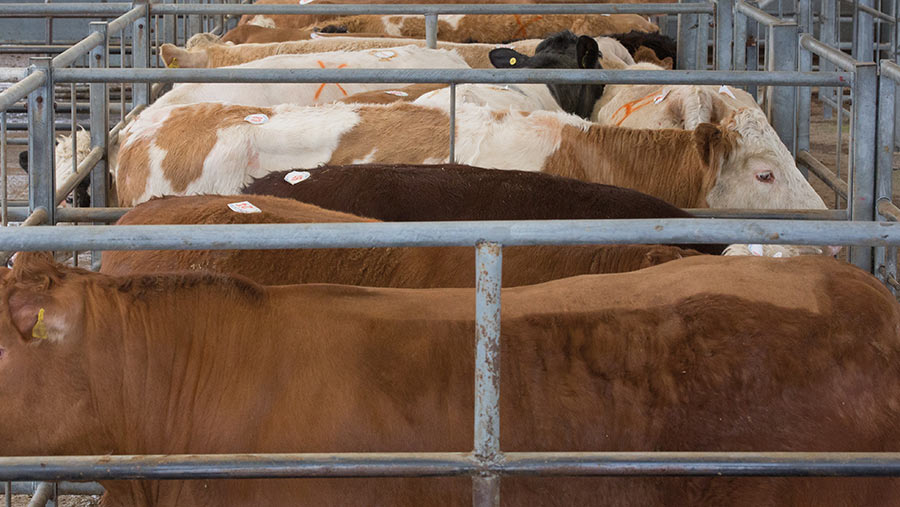‘Market-top’ debate follows 5-10p/kg beef processor cuts
 © Tim Scrivener
© Tim Scrivener Processor price cuts of 5-10p/kg have left beef finishers asking whether trade has hit a market top or if processors are “playing games” to draw out more cattle.
Many factory base prices remain unchanged at record highs, but some price cuts have caused concern for finishers who have paid through the nose for forward store cattle.
With cattle supplies tight in Ireland, steers 8.6% dearer on the year across Europe, and UK slaughter figures down, some feel the cuts are a ruse to scare finishers into selling cattle early.
Auctioneers say whether this is the case remains to be seen, but much will hinge on lockdown relaxation and the return of the food service sector this summer.
See also: Record UK beef prices lead to Irish cattle imports
Bakewell
Whether beef prices have topped is anyone’s guess, according to auctioneer Oliver Hiles of Bagshaws, who stressed that the market was still in “uncharted waters” of travel restrictions and lockdown buying.
“Liveweight trade remains very similar to how we’ve seen it in recent weeks; there’s still no slackening off,” said Mr Hiles.
He said dairy-cross continental cattle had made 200-230p/kg, the best prime clean cattle had hit 260p/kg and the best native cattle were well above 200p/kg.
The prices had forced more people to sell stores in the market as opposed to dealing privately, he added.
“It’s been so hard to value cattle, so big numbers of stores have been sold through the ring this spring.”
Darlington
Prime bulls have regularly broken the £2,000-a-head barrier since December for auctioneer Paul Gentry and the team at Darlington Farmers Auction Mart.
Demand for all cattle is good, with two cows above £2,000 last week (26 April), including a Blue cow at 235p/kg. Store bulls topped at £1,800 and store bullocks topped at £1,700.
Several bull vendors saw consignments level at 243-252p/kg, and average £1,611-£1,893 a head on Thursday (29 April).
Mr Gentry said: “It’s important to stress that in the liveweight market many bulls over 16 months of age and 420kg deadweight, which would be heavily penalised in the deadweight sector, are making high prices.”
He questioned the inconsistency of several deadweight buyers who have recently waived weight limits and penalties because beef is tight and they are desperate for it.
“Stories of large carcasses producing cuts that don’t fit in the pack and primal cuts that are too heavy don’t currently seem to matter,” Mr Gentry added.
